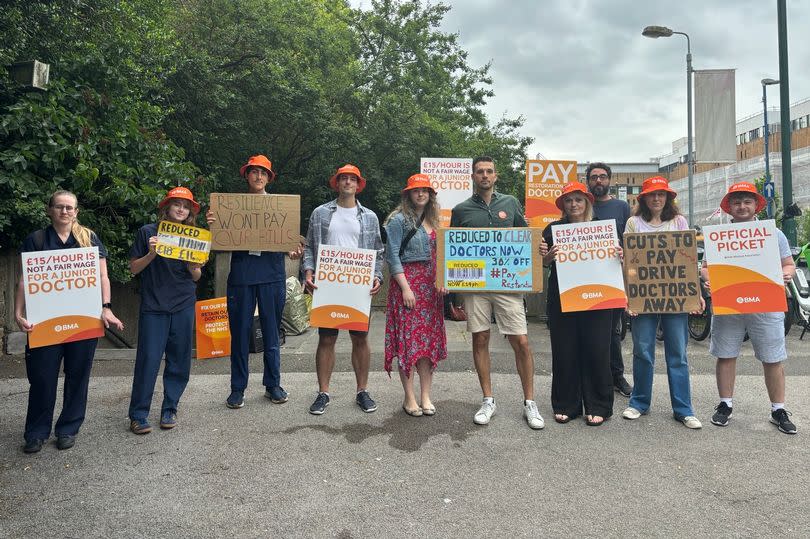Junior doctors striking at QMC warn NHS medics are considering leaving UK

Junior doctors striking in Nottingham have warned some young medics in the city are now leaving the NHS and the country because of low pay and working conditions in the UK. The five-day strike by Junior doctors, organised by British Medical Association, members, started at 7am yesterday, (Thursday, June 27) and runs until to 7am next Tuesday (July 2).
The local NHS is warning city and county hospitals, mental health services and GP surgeries will all be affected – but urged people who need urgent help not to stop coming to emergency departments if they need to. Medics formed a picket at the Queen’s Medical Centre ( QMC ) in Nottingham on Thursday morning as the latest action started.
Those behind the strikes are demanding a pay rise of 35 per cent – saying current levels of around £15 per hour for junior doctors are too low, when compared with £100,000 student debt figures across to profession. Dr Tal Ellenbogen, a surgical trainee in trauma and orthopaedics and deputy chair of the East Midlands Doctors’ Committee, says growing numbers of local doctors are moving abroad, or are considering doing so.
Get the latest news straight to your phone by joining us on WhatsA p p
He said: “It’s sad that we are here today in the first place as no doctor wants to go on strike, but we have seen our pay cut [in real terms] over the last 15 years by over 26 per cent. What that means is so many doctors are leaving for other countries.
“Just last week I found out another doctor has gotten a job in Adelaide, Australia, and I’ve got a senior colleague who has finished their training here but they’ve chosen to be a consultant in Adelaide – another friend of mine is off to New Zealand.”
In April, a survey commissioned by the General Medical Council found around one in ten UK doctors believe it “very likely” they will leave the UK to practice abroad in the next 12 months.
Melissa Ryan, a paediatric trainee at the hospital, questioned why the dispute had not been settled after 11 walkouts across 20 months. She said: “In my mind, staff retention and retaining doctors in the NHS is a good thing.
“They’ve spent more money covering the strikes than they would have if they had just come and settled in the first place- it’s 20 months later and we’re still here.”
Doctors say they are battling with understaffed work environments, extensive waiting lists and cancelled appointments, and a pay increase would help to retain staff and populate the field. Dr Ellenbogen said: “Yesterday I was due to be on an operating list but we were short staffed, we didn’t have any doctors to cover the on call bleep.
“We ended up having to take myself and the doctor off our theatre list for part of the day to cover those referral bleeps and at the same time covering all our patients on the wards and seeing patients in two clinics.”
Elaine Ping, a warehouse worker, recently broke her wrist and praised the care she received at the QMC. Asked for her opinion on the strike, she said: “Good on ‘em, I think they should because they need more money.
“I’ve broken my wrist and I’ve been to different parts of the hospital and they’ve been brilliant, they really have… You can’t really do without them, you need them. You can’t blame [doctors] in a way for [leaving] but they shouldn’t have to be in that position.”
Matt Lee, a warehouse worker who walked past the protest said: “They shouldn’t be in this situation, be forced to do this. There’s other jobs where people are getting more than they should be, like politicians… these are the people actually saving lives, it’s just unfair.”
The Government has repeatedly said the 35 per cent rise is unaffordable, saying ultimately tax payers would have to fund it. Hospital trusts in Nottinghamshire have warned spending has increased in order to cover the industrial action.
In May the NHS trust which runs the Queen’s Medical Centre and Nottingham City Hospital said it had spent £71m more than expected over the last 12 months, partly because of strikes, and now faces a deficit of at least £80 million for each of the next two years.
Mark Simmonds, Deputy Medical Director at Nottingham University Hospitals NHS Trust, said: “We apologise for any disruption patients may experience during the upcoming Industrial Action. If we have not contacted you, please attend your appointment as planned.
“Whilst strikes create significant pressure, patient safety is our highest priority, and we have well-tested plans in place to ensure we can continue to deliver urgent and emergency care to those who need it.
“Our Emergency Department will continue to be open as normal. It is really important that patients who need urgent medical care continue to come forward, especially in emergency and life-threatening cases.”
He added those with urgent conditions should also consider whether they could use other NHS services such as NHS 111, local pharmacies or urgent treatment centres.

 Yahoo News
Yahoo News 
